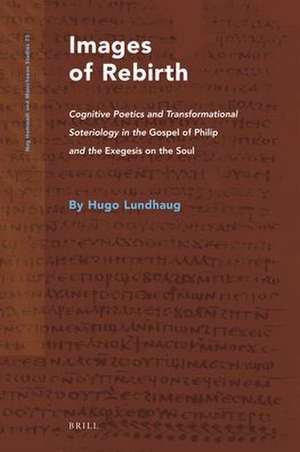Images of Rebirth: Cognitive Poetics and Transformational Soteriology in the <i>Gospel of Philip</i> and the <i>Exegesis on the Soul</i>: Nag Hammadi and Manichaean Studies, cartea 73
Autor Hugo Lundhaugen Limba Engleză Hardback – 8 aug 2010
Din seria Nag Hammadi and Manichaean Studies
- 18%
 Preț: 928.80 lei
Preț: 928.80 lei - 18%
 Preț: 674.68 lei
Preț: 674.68 lei - 18%
 Preț: 590.65 lei
Preț: 590.65 lei - 18%
 Preț: 679.63 lei
Preț: 679.63 lei - 18%
 Preț: 706.53 lei
Preț: 706.53 lei - 18%
 Preț: 630.19 lei
Preț: 630.19 lei - 18%
 Preț: 759.35 lei
Preț: 759.35 lei - 18%
 Preț: 555.91 lei
Preț: 555.91 lei - 18%
 Preț: 1662.49 lei
Preț: 1662.49 lei - 18%
 Preț: 2015.00 lei
Preț: 2015.00 lei - 18%
 Preț: 882.32 lei
Preț: 882.32 lei - 18%
 Preț: 1004.47 lei
Preț: 1004.47 lei - 18%
 Preț: 1128.54 lei
Preț: 1128.54 lei - 18%
 Preț: 875.24 lei
Preț: 875.24 lei - 18%
 Preț: 998.54 lei
Preț: 998.54 lei - 18%
 Preț: 2655.20 lei
Preț: 2655.20 lei - 18%
 Preț: 1178.29 lei
Preț: 1178.29 lei - 18%
 Preț: 1886.91 lei
Preț: 1886.91 lei - 18%
 Preț: 1244.03 lei
Preț: 1244.03 lei - 18%
 Preț: 723.17 lei
Preț: 723.17 lei - 18%
 Preț: 1072.09 lei
Preț: 1072.09 lei - 18%
 Preț: 917.13 lei
Preț: 917.13 lei - 18%
 Preț: 834.60 lei
Preț: 834.60 lei - 18%
 Preț: 857.97 lei
Preț: 857.97 lei - 18%
 Preț: 778.24 lei
Preț: 778.24 lei - 18%
 Preț: 869.87 lei
Preț: 869.87 lei - 18%
 Preț: 1063.77 lei
Preț: 1063.77 lei - 18%
 Preț: 1420.32 lei
Preț: 1420.32 lei - 18%
 Preț: 1334.07 lei
Preț: 1334.07 lei - 18%
 Preț: 666.34 lei
Preț: 666.34 lei - 18%
 Preț: 703.85 lei
Preț: 703.85 lei - 18%
 Preț: 884.04 lei
Preț: 884.04 lei - 18%
 Preț: 679.07 lei
Preț: 679.07 lei - 18%
 Preț: 720.30 lei
Preț: 720.30 lei - 18%
 Preț: 1017.72 lei
Preț: 1017.72 lei - 18%
 Preț: 742.35 lei
Preț: 742.35 lei - 18%
 Preț: 716.43 lei
Preț: 716.43 lei - 18%
 Preț: 715.59 lei
Preț: 715.59 lei - 18%
 Preț: 887.62 lei
Preț: 887.62 lei - 18%
 Preț: 819.18 lei
Preț: 819.18 lei - 18%
 Preț: 868.58 lei
Preț: 868.58 lei - 18%
 Preț: 680.57 lei
Preț: 680.57 lei - 18%
 Preț: 1237.91 lei
Preț: 1237.91 lei - 18%
 Preț: 595.83 lei
Preț: 595.83 lei - 18%
 Preț: 1317.56 lei
Preț: 1317.56 lei - 18%
 Preț: 924.55 lei
Preț: 924.55 lei - 18%
 Preț: 1129.57 lei
Preț: 1129.57 lei - 18%
 Preț: 1047.66 lei
Preț: 1047.66 lei - 18%
 Preț: 1878.09 lei
Preț: 1878.09 lei
Preț: 1177.06 lei
Preț vechi: 1435.43 lei
-18% Nou
Puncte Express: 1766
Preț estimativ în valută:
225.23€ • 235.75$ • 187.46£
225.23€ • 235.75$ • 187.46£
Carte indisponibilă temporar
Doresc să fiu notificat când acest titlu va fi disponibil:
Se trimite...
Preluare comenzi: 021 569.72.76
Specificații
ISBN-13: 9789004180260
ISBN-10: 9004180265
Pagini: 594
Dimensiuni: 160 x 240 mm
Greutate: 0 kg
Editura: Brill
Colecția Brill
Seria Nag Hammadi and Manichaean Studies
ISBN-10: 9004180265
Pagini: 594
Dimensiuni: 160 x 240 mm
Greutate: 0 kg
Editura: Brill
Colecția Brill
Seria Nag Hammadi and Manichaean Studies
Notă biografică
Hugo Lundhaug, Dr. art. (2007) in the History of Religions, University of Bergen, is a Senior Research
Fellow at the University of Oslo. He has published articles on the Nag Hammadi texts, early Egyptian
monasticism, and cognitive theory.
Fellow at the University of Oslo. He has published articles on the Nag Hammadi texts, early Egyptian
monasticism, and cognitive theory.
Recenzii
Future study of Exeg[esis of the]. Soul and Gos[pel of]. Philip will have to take this book into account.
Birger A. Pearson, Religious Studies Review 37,2
'...Lundhaug has succeeded in showing that recent theories of cognitive poetics can aid in the delineation of rhetorical structures and possible polemical edges...Lundhaug's approach is sufficiently presented as to require future studies of the Nag hammadi texts and of early Egyptian Christianity to take this book into account.'
John D. Turner, Vigiliae Christianae 67 (2013)
Birger A. Pearson, Religious Studies Review 37,2
'...Lundhaug has succeeded in showing that recent theories of cognitive poetics can aid in the delineation of rhetorical structures and possible polemical edges...Lundhaug's approach is sufficiently presented as to require future studies of the Nag hammadi texts and of early Egyptian Christianity to take this book into account.'
John D. Turner, Vigiliae Christianae 67 (2013)
Descriere
This book offers fresh readings of the Gospel of Philip (NHC II.3) and the Exegesis on the Soul (NHC II.6) from new theoretical and historical perspectives. Eschewing the category of “Gnosticism” and challenging common categorisations, the book analyses the preserved Coptic texts as coherent Christian compositions contemporary with the production and use of the Nag Hammadi Codices. A methodological framework based on Cognitive Poetics is outlined and applied to illuminate how the texts present a soteriology of transformation through religious rituals and practices using complex conceptual and intertextual blends with important polemical and paraenetic functions. The analysis highlights the use of metaphors and allusions in (re-)interpretations of authoritative Scripture, ritual and dogma. Complete Coptic texts and translations are included.
